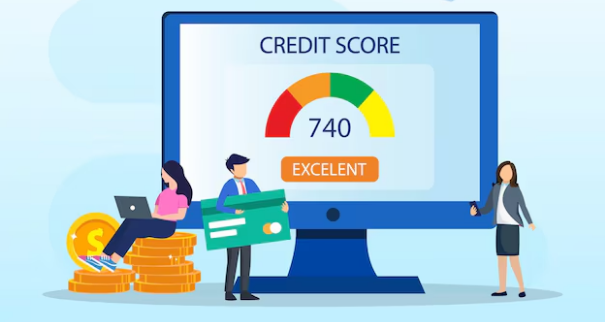In today’s financial landscape, your credit score is more than just a number; it’s a critical factor that can influence many aspects of your life. From securing loans to determining the interest rates on your mortgage, a good credit score can open doors, while a poor one can limit your financial opportunities. Understanding the importance of monitoring your credit score regularly is essential for maintaining financial health and achieving long-term financial goals.
Regularly checking your credit score isn’t just about knowing a number—it’s about staying informed, protecting yourself against identity theft, and being prepared for future financial needs. By understanding the factors that impact your score and how to manage them, you can make informed decisions that will benefit you both now and in the future.
Why monitoring your credit score matters

Monitoring your credit score is crucial because it directly impacts your financial well-being. A credit score is a reflection of your creditworthiness, and lenders use it to determine the risk of lending you money. The higher your score, the more likely you are to be approved for loans and credit cards with favorable terms. Conversely, a low credit score can result in higher interest rates or even denial of credit.
One of the most significant reasons to monitor your credit score is to stay on top of any changes that could affect your creditworthiness. Whether it’s a sudden drop due to an error or an increase due to responsible financial behavior, being aware of these changes allows you to take action quickly. Regular monitoring helps you spot inaccuracies on your credit report, such as incorrect personal information or fraudulent accounts, which could negatively impact your score if left unaddressed.
Another critical aspect of monitoring your credit score is the ability to understand the factors that influence it. Your payment history, the amount of debt you owe, the length of your credit history, new credit inquiries, and the types of credit you use all play a role in determining your score. By keeping an eye on these factors, you can make better financial decisions and avoid behaviors that might harm your score.
Protecting yourself from identity theft
Identity theft is a growing concern, and your credit score can be an early indicator that something is wrong. When someone steals your identity, they may open new credit accounts in your name, max out your existing credit cards, or take out loans that you have no knowledge of. All of these actions can severely damage your credit score and take years to correct.
By regularly monitoring your credit score, you can quickly spot any suspicious activity. If you notice a sudden drop in your score or see unfamiliar accounts on your credit report, it’s essential to act immediately. Contact the credit bureaus to report the fraud, freeze your credit, and work with creditors to resolve the issue. Early detection is key to minimizing the damage caused by identity theft and restoring your credit score.
Preparing for major financial decisions
Your credit score plays a pivotal role when it comes to major financial decisions, such as buying a home, purchasing a car, or even starting a business. Lenders rely heavily on your credit score to determine your eligibility for loans and the interest rates you’ll be offered. A higher credit score not only increases your chances of approval but also results in lower interest rates, which can save you thousands of dollars over the life of a loan.
Regularly monitoring your credit score allows you to prepare for these significant financial milestones. If you know your score is lower than you’d like, you can take steps to improve it before applying for a loan. This might involve paying down debt, disputing errors on your credit report, or establishing a longer credit history. By improving your score in advance, you can secure better loan terms and reduce the financial burden of large purchases.
Understanding the impact of hard inquiries
Every time you apply for credit, whether it’s a credit card, loan, or mortgage, the lender will perform a hard inquiry on your credit report. While one or two hard inquiries may not significantly impact your score, multiple inquiries in a short period can lower your score and make you appear as a higher risk to lenders. This is why it’s essential to be strategic about when and how often you apply for new credit.
Monitoring your credit score allows you to keep track of the number of hard inquiries on your report. If you notice an unexpected increase in inquiries, it could indicate fraudulent activity or that you’ve been applying for credit more often than you realized. By staying informed, you can limit unnecessary inquiries and protect your credit score from avoidable drops.
Maintaining a healthy credit utilization ratio
Another critical factor in your credit score is your credit utilization ratio—the amount of credit you’re using compared to your total available credit. A high credit utilization ratio can negatively impact your score, as it suggests to lenders that you may be overextended and at risk of defaulting on your payments. Ideally, you should aim to keep your credit utilization below 30% to maintain a healthy credit score.
Regular monitoring of your credit score helps you keep an eye on your credit utilization ratio. If you see that your ratio is creeping up, you can take steps to pay down your balances or increase your credit limit. This proactive approach helps ensure that your credit score remains strong and that you’re in a good position to apply for credit when needed.
In conclusion, regularly monitoring your credit score is an essential practice for anyone looking to maintain financial health in the United States. Your credit score impacts many aspects of your financial life, from securing loans to protecting yourself against identity theft. By staying informed and taking proactive steps to manage your credit, you can ensure that your score remains strong and that you’re well-prepared for any financial challenges that come your way.
Monitoring your credit score isn’t just a one-time task—it’s an ongoing process that requires attention and care. Whether you’re planning for a major purchase, protecting yourself from fraud, or simply aiming to improve your financial health, keeping an eye on your credit score is a crucial part of achieving your goals. So, take charge of your financial future by making credit score monitoring a regular part of your routine.





